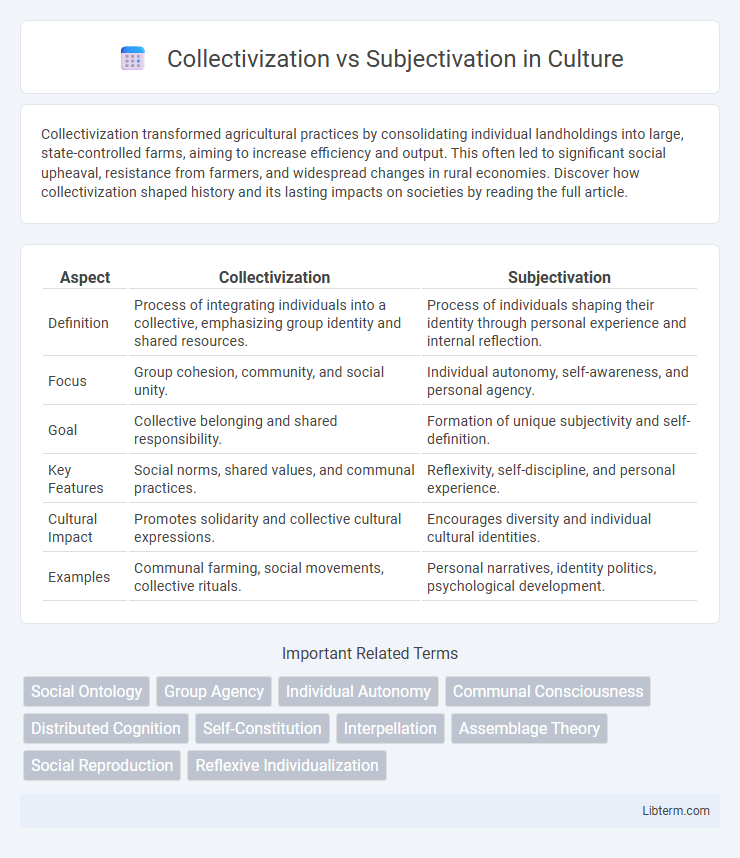Collectivization transformed agricultural practices by consolidating individual landholdings into large, state-controlled farms, aiming to increase efficiency and output. This often led to significant social upheaval, resistance from farmers, and widespread changes in rural economies. Discover how collectivization shaped history and its lasting impacts on societies by reading the full article.
Table of Comparison
| Aspect | Collectivization | Subjectivation |
|---|---|---|
| Definition | Process of integrating individuals into a collective, emphasizing group identity and shared resources. | Process of individuals shaping their identity through personal experience and internal reflection. |
| Focus | Group cohesion, community, and social unity. | Individual autonomy, self-awareness, and personal agency. |
| Goal | Collective belonging and shared responsibility. | Formation of unique subjectivity and self-definition. |
| Key Features | Social norms, shared values, and communal practices. | Reflexivity, self-discipline, and personal experience. |
| Cultural Impact | Promotes solidarity and collective cultural expressions. | Encourages diversity and individual cultural identities. |
| Examples | Communal farming, social movements, collective rituals. | Personal narratives, identity politics, psychological development. |
Understanding Collectivization: Definition and Origins
Collectivization refers to the process by which individual interests and actions are integrated into collective social structures, often emphasizing shared goals and communal ownership. Originating from Marxist theory and socialist practices, collectivization seeks to reshape societal relationships by transforming private property and individual labor into collective endeavors. The concept gained prominence during the early 20th century, notably in Soviet agricultural policies aimed at consolidating land and resources under state control.
Subjectivation Explained: Concept and Influences
Subjectivation refers to the process through which individuals become subjects by internalizing external norms, values, and power structures, shaping their identity and agency. It is influenced by social, cultural, and political contexts that dictate how people perceive themselves and their roles within society. This concept highlights the dynamic interaction between external forces and personal autonomy in the formation of subjectivity.
Historical Context: Societies and Collective Action
Collectivization involves the organized process where individuals in societies prioritize group goals and shared responsibilities, often manifesting in political or economic frameworks such as Soviet agricultural policies. Subjectivation refers to how individuals internalize societal norms and power structures, shaping personal identity and agency within collective action frameworks. Historically, the tension between collectivization and subjectivation reveals how societies balance institutional impositions with individual subjectivity, influencing movements from labor unions to revolutionary uprisings.
The Roots of Individual Agency: Subjectivation in Practice
Subjectivation in practice emerges from dynamic processes where individuals internalize social norms, shaping their agency within collective frameworks. This concept contrasts with collectivization, which emphasizes external aggregation of individuals into groups, while subjectivation prioritizes personal transformation and self-awareness as foundational to agency. The roots of individual agency lie in this continuous interplay between social structures and personal identity formation, highlighting how subjectivation facilitates active participation rather than passive membership.
Key Philosophers and Theorists: Debates on Collectivization vs. Subjectivation
Maurice Merleau-Ponty's phenomenology emphasizes subjectivation as an embodied experience shaping individual agency within collective structures, while Michel Foucault critiques power relations that mold subjectivities, highlighting the tension between social collectivization and individual subject formation. Gilles Deleuze and Felix Guattari challenge traditional collectivization by advocating for rhizomatic subjectivation, promoting multiplicity and deterritorialization over hierarchical collectives. These debates reveal complex interactions between collective identity formation and individual subjectivity in contemporary philosophical discourse.
Social Structures: Navigating Group Dynamics and Personal Identity
Collectivization emphasizes the formation and reinforcement of social structures where group identity and common goals drive individual behavior, fostering a sense of belonging and shared responsibility. Subjectivation involves the processes through which individuals internalize societal norms and create personal identities, negotiating their place within social hierarchies and collective frameworks. Balancing these dynamics requires understanding how social structures shape personal identity while individuals influence and transform group interactions through subjective experiences.
Power, Control, and Resistance: Impacts on the Self
Collectivization enforces centralized power structures that prioritize group identity and control over individual autonomy, often leading to the suppression of personal agency. Subjectivation involves the internalization of power relations, where individuals negotiate control through self-discipline and resistance, shaping their own subjectivity within social frameworks. The dynamic interplay between external control and internal resistance profoundly transforms the self, influencing identity formation and modes of empowerment.
Collectivization in Contemporary Culture and Politics
Collectivization in contemporary culture and politics emphasizes the integration of individual identities into larger social groups to foster solidarity and collective action against systemic issues. This process shapes political movements by prioritizing shared goals and communal values over individualism, influencing policies around social justice, environmental activism, and economic equality. Through media, art, and grassroots organizing, collectivization cultivates a sense of belonging and collective responsibility essential for mobilizing societal change.
Subjectivation in Modern Psychological and Social Discourse
Subjectivation in modern psychological and social discourse emphasizes individual autonomy, identity formation, and self-awareness as fundamental processes shaping human behavior and social interaction. It contrasts with collectivization by prioritizing personal agency and subjective experiences over group conformity and collective identity. Contemporary theories highlight subjectivation's role in empowering individuals to negotiate social structures and resist homogenizing forces within culture and society.
Balancing the Collective and the Individual: Challenges and Opportunities
Balancing collectivization and subjectivation involves navigating the tension between group cohesion and individual autonomy, where collectivization emphasizes shared goals and social integration, while subjectivation prioritizes personal identity and self-expression. Challenges arise in preserving individual freedoms within collective frameworks, necessitating adaptive governance and inclusive practices that respect diverse subjectivities. Opportunities include fostering collaborative environments that enhance social solidarity without eroding individual agency, enabling innovation and resilience in complex social systems.
Collectivization Infographic

 libterm.com
libterm.com